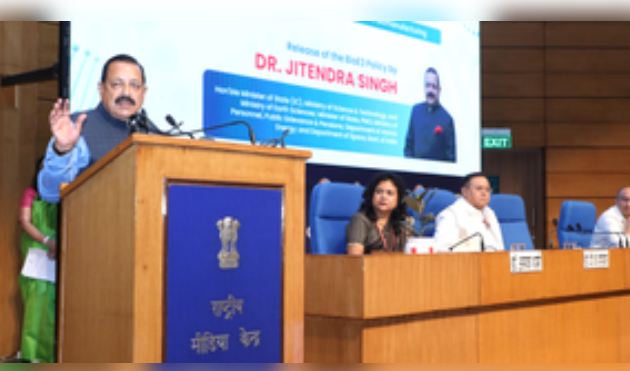Business
Bio-manufacturing, Bio-foundry will promote India’s green growth: Dr. Jitendra Singh

New Delhi, Sep 1
Biomanufacturing and bio-foundry, which are part of the new BioE3 (Biotechnology for Economy, Environment and Employment) policy, will drive India’s green growth, said Dr. Jitendra Singh, Union Minister of State (Independent Charge) for Science and Technology.
He said this while formally releasing the pathbreaking new Bioeconomy policy at L Media Centre in the national capital.
Approved recently by the Union Cabinet, the Bio E3 policy aims to drive high-performance biomanufacturing aligned with initiatives like ‘net zero’ carbon economy.
“Bio-manufacturing and bio-foundry will drive India’s future bioeconomy and promote "green growth", Singh said.
Singh also hailed India as the global torchbearer of the next Industrial Revolution.
“BioE3 policy will prove to be a milestone not only for the bioeconomy but a game changer for Viksit Bharat 2047” Singh said, highlighting the progress of the country's bioeconomy in the last decade -- from $10 billion in 2014 to over $130 billion in 2024.
It is projected to reach $300 billion by 2030, he said. He noted that biotechnology has a huge potential for driving the next revolution of 21st generation.
“The IT revolution was west driven, the biotechnology revolution will be India-driven,” the Minister said, adding that the “BioE3 policy will have a momentous impact on various sectors like food, energy and health”.
The Science and Technology Minister highlighted the six thematic themes: bio-based chemicals and enzymes; functional foods and smart proteins; precision biotherapeutics; climate resilient agriculture; carbon capture and its utilisation; and futuristic marine and space research.
Singh also underscored the public-private-partnership (PPP) model, as seen in the success achieved in the space and bio-economy sectors. He said the PPP model “will be an intrinsic part of Bioe3 Policy implementation, incentivising industry to promote employment generation”.
Noting it is the best time for biotechnology in India, he emphasised the country’s “huge wealth of bioresources, an unsaturated resource waiting to be harnessed”
This has “an advantage in biotechnology, especially due to the vast biodiversity and the unique bioresources in the Himalayas.
Then there is the 7,500 km long coastline and last year we launched the Deep Sea Mission which is going to dig the biodiversity beneath the seas,” he said.



































